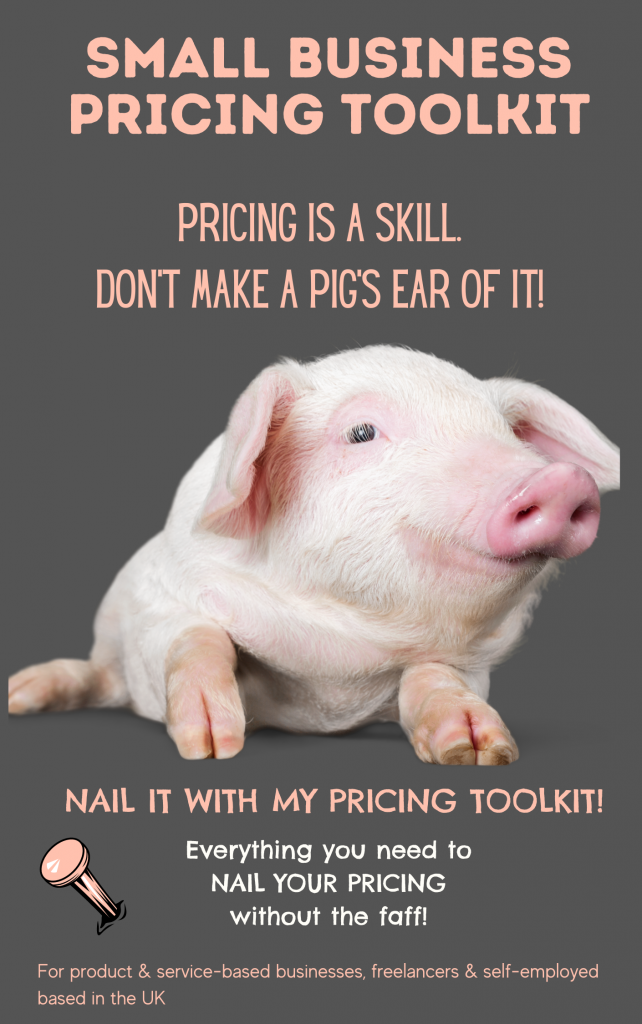Nailing your pricing is essential whether you run a product-based or service-based business. As a small business owner, you will know that getting your pricing right is a delicate balance between making a profit and keeping your customers happy!

Top 10 tips for getting your small business pricing right
Here are my top 10 tips for getting your small business pricing right without the guesswork:
1. Narrow down your niche
The narrower your market niche, the more you can charge! This is because a niche market is often a loyal group of customers/clients who are willing to pay a bit more for the kinds of unique products and services that they are passionate about, especially since they are not so easy to find.
2.Know your target market
Successful marketing relies on understanding your target market. You need to know what type of person you are selling to (your ideal client/customer) and why they would be interested in your products/services. A target market is important as it will help your brand stand out from your competitors, establish a positive reputation and position you as an authority in your niche. Obviously, if you provide luxury goods or high-end services, your target market will be more affluent so will be able to charge more.
3.Research your competitors
Competitive pricing will help you establish your brand positioning based on price point. For example, are you budget, premium or somewhere in the middle? It will also help you identify where you can lower your prices to gain a competitive edge or increase them to grow margins. It will also give you insight into your competitors existing pricing strategies. Once you have this knowledge, you can optimize your pricing as appropriate.
4. Know your costs when you do your pricing
You will need to consider your fixed and variable costs when you do your pricing. Fixed costs are the costs associated with your business’s products or services that must be paid regardless of the volume you sell. One example of a fixed cost is your overheads.A variable cost, or variable expense, is the price of raw materials, distribution, and labour associated with each unit of product/ service you sell.
5.Charge based on value not time (service-based businesses)
Set your pricing based on what benefits your customers are gaining from your service. For example, you can charge more if you have a specialised skillset, offer a quick turnaround time and have an affluent client base. If in doubt, price higher rather than lower. You can always adjust it later and it’s easier to go lower than the other way round!
6.Sell premium products and limited-edition products (product-based businesses)
You will be able to sell your products at higher prices if they are premium/limited-edition. Obviously, handmade products should be priced at the higher end as the customer is buying something special as opposed to mass produced products.
7.Position yourself as an expert in your niche
If you want to charge higher prices for your products or services you need to position yourself as a ‘trusted’ expert. A blog is a clever way of achieving this. It goes without saying that people will be happier to pay more for your products or services if you are the ‘go-to person’ in your niche.
8.Customer Satisfaction is key to pricing
This is vital whether you’re selling products or services. For products offer a money back guarantee if the customer is not 100% satisfied and for services, go the extra mile and follow up with your clients after you have completed your work to make sure they are happy. Customers are often willing to pay more money if a brand has a good reputation than a brand with a poor reputation. This is likely to make the business more profitable.
9.Pricing needs to be transparent
Price transparency helps consumers determine price fairness of the product or service you are providing. By being transparent, it will give you an advantage when you want to increase your prices. When consumers know how businesses set and change their prices, it helps them empathise with any decisions made regarding their pricing.
10.Build a strong brand identity to supercharge your pricing
A strong brand identity will help you add long-term value to your small business. You will be able to command a higher price if your brand is perceived as more desirable than your competitors! A strong brand identity will also help promote customer loyalty and therefore supercharge sales. For example, Heinz can charge more for their baked beans than a generic supermarket brand.
Small Business Pricing Toolkit
Grab a copy of my ‘Small Business Pricing Toolkit’ to help you nail your pricing without the faff!

